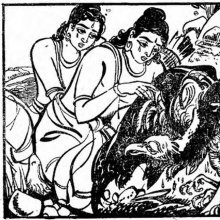Exhausted: 1 definition
Introduction:
Exhausted means something in Hinduism, Sanskrit. If you want to know the exact meaning, history, etymology or English translation of this term then check out the descriptions on this page. Add your comment or reference to a book if you want to contribute to this summary article.
Images (photo gallery)
In Hinduism
Shilpashastra (iconography)
Source: Shodhganga: Elements of Art and Architecture in the Trtiyakhanda of the Visnudharmottarapurana (shilpa)Exhausted animals are associated with the Summer season, which follows specific guidelines of ancient Indian Painting (citra), according to the Viṣṇudharmottarapurāṇa, an ancient Sanskrit text which (being encyclopedic in nature) deals with a variety of cultural topics such as arts, architecture, music, grammar and astronomy.—The Viṣṇudharmottarapurāṇa gives some instructions to make the picture of every season beautiful and natural. In the Ṛtusaṃhāra, giving the description of the summer season, Kālidāsa says that the summer season is the hot season when the sun becomes fierce and the moon becomes peaceful. Due to the hot weather, the animal of the forest become exhausted and that is why even the peacocks do not kill the serpents. The wild pigs hide themselves in ponds wherein the mud dries up. [...] Thus, every season has its own peculiarities and charms, such as a exhausted animals in the summer. The seasons always encourage the painters to grab different ideas from the nature.

Shilpashastra (शिल्पशास्त्र, śilpaśāstra) represents the ancient Indian science (shastra) of creative arts (shilpa) such as sculpture, iconography and painting. Closely related to Vastushastra (architecture), they often share the same literature.
See also (Relevant definitions)
Full-text (+499): Parikshina, Pariglana, Klanta, Jasuri, Jash, Niprana, Glapita, Nishprana, Samapti, Glasnu, Parikilamati, Nijhura, Klam, Kshinasukrita, Glana, Kshatapunyalesha, Glai, Sadita, Pariklishta, Parikkhina.
Relevant text
Search found 248 books and stories containing Exhausted; (plurals include: Exhausteds). You can also click to the full overview containing English textual excerpts. Below are direct links for the most relevant articles:
The Great Chariot (by Longchenpa)
1c) The benefit that virtue increases ever higher < [Part 1 - The explanation of the benefits]
D. The dedication of merit < [Chapter XI - Meditation, the Chapter of Spotless dhyana]
C. The dedication of merit < [Chapter XII - The Limbs of the Path of Skillful Means in Establishing samadhi]
Bhagavati-sutra (Viyaha-pannatti) (by K. C. Lalwani)
Part 3 - Karma experience and exhaustion < [Chapter 3]
Part 1 - On the knowledge of the Law without hearing < [Chapter 31]
Part 9 - Knowledge of the omniscient < [Chapter 4]
Rasa Jala Nidhi, vol 1: Initiation, Mercury and Laboratory (by Bhudeb Mookerjee)
Part 20 - Mercurial operations (18): Transformation of base metals into gold by mercury (bedhana) < [Chapter IV-V - Mercurial operations]
Part 19 - Mercurial operations (17): Dyeing of mercury (ranjana) < [Chapter IV-V - Mercurial operations]
Part 16 - Mercurial operations (14): Exhaustion of mercury (yarana) < [Chapter IV-V - Mercurial operations]
Brahma Sutras (Shankara Bhashya) (by Swami Vireshwarananda)
Chapter IV, Section I, Adhikarana XIV < [Section I]
Chapter IV, Section I, Adhikarana XI < [Section I]
Chapter III, Section I, Adhikarana II < [Section I]
Shrimad Bhagavad-gita (by Narayana Gosvami)
Verse 9.21 < [Chapter 9 - Rāja-guhya-yoga (Yoga through the most Confidential Knowledge)]
Verse 2.27 < [Chapter 2 - Sāṅkhya-yoga (Yoga through distinguishing the Soul from the Body)]
Verse 8.25 < [Chapter 8 - Tāraka-brahma-yoga (the Yoga of Absolute Deliverance)]
